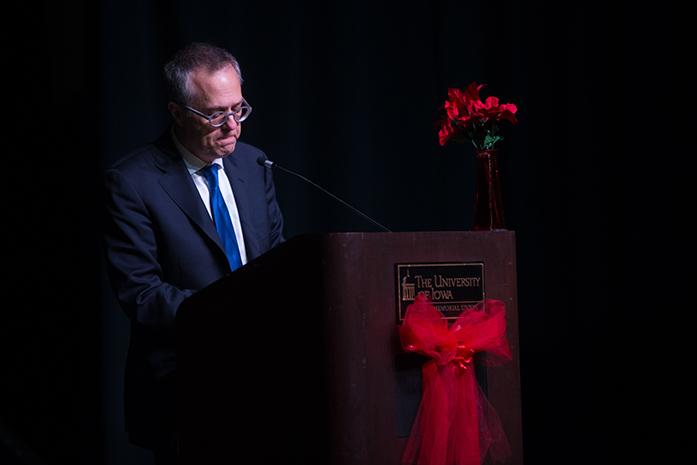By Addison Martin
On Wednesday evening, University of Iowa students and faculty faced the cold to gather at the IMU to hear Michael Gerson, a Washington Post columnist, former presidential speechwriter, and now a ONE Policy fellow who focuses on the fight against HIV and AIDS in the United States and abroad.
Gerson’s speech began with a personal story about the death of his college roommate, a victim of AIDS who was the reason Gerson began to explore the causes and prevention of the disease, as well as governmental involvement in treatment and foreign aid.
“I was introduced into the global aids crisis in the 1990s when my roommate, Jordan, died of AIDS. He was class president, he knew the names of everyone on campus,” Gerson said. “I watched his life fade painfully away, only a few years before the development of miracle drugs that could have saved him.”
The emotion and heartfelt feelings continued throughout his speech, filled with personal stories and shocking statistics about the AIDS epidemic in the 1990s.
Gerson entered the White House roughly seven years after the death of his close friend at a time when the AIDS crisis was in full swing, he said. He noted the number of AIDS cases to the number of cases going untreated, most of them in rural southern Africa.
“Millions were dying at the same time, and yet in total isolation … in the worst affected countries, life expectancy had fallen by 20 years,” he said.
His best day in Washington, D.C., Gerson said, was the day President George W. Bush approved the President’s Emergency Plan for AIDS Relief. Gerson sees that day in the Oval Office as a turning point in the AIDS epidemic.
“Today, there are more than 17 million people on AIDS treatment, thanks to PEPFAR, the global fund, and growing contributions of countries themselves,” he said. “These are some of the largest, broadest gains in the history of public health … and most Americans know absolutely nothing about it. Much of a generation in Africa lived to care for their children because Americans cared and acted.”
Among other details of the politics involved, Gerson said, in the usually bitter and divided world of politics, this topic has been a bipartisan breath of fresh air. In his experiences, he said, regardless of party identifier, the AIDS epidemic is important to all.
One of the last stories he told was that of his “most vivid visit” to a hospital in Rwanda, where he was told there were no AIDS cases that day and that the hospital was focusing on underweight babies and diabetes.
“It’s the most hopeful thing I’ve seen on one of my trips … the possibility of good in the world,” he said.
UI freshmen Jane Rice and Connor Jacobmeyer attended with hopes of becoming more informed about the AIDS epidemic, which Gerson said was little-known in their generation.
“I wanted to be more informed about the AIDS epidemic in Africa because I know that’s a very prevalent issue there,” Jacobmeyer said.
Journalism major Rice was interested because of Gerson’s past at the Post.
“I’m very interested in global politics in general, so I thought this would be a really interesting talk to go to,” she said.



